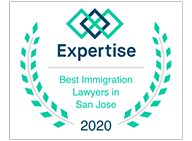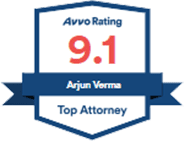
EB-1 Visa Guide
Contact Our San Jose and San Francisco Immigration Lawyers for Experienced Help
First Preference Employment-Based Immigration includes three different categories: Extraordinary Ability (EB-1A), Outstanding Professors and Researchers (EB-1B), and Multinational Managers or Executives (EB-1C).
Our office in San Jose sits in the heart of Silicon Valley, allowing us to assist a diverse range of applicants throughout the Bay Area. We frequently support clients from leading technology companies, universities, and startups across Northern California. As an EB1 visa attorney in San Jose, we stay current on local demand and the needs of employers here, ensuring every case meets current standards and expectations.
What to Expect During the EB-1 Visa Process in San Jose
Pursuing an EB-1 visa in San Jose means navigating steps that often involve collaboration between the applicant, employer, and legal representatives. Each case begins with a detailed evaluation of individual qualifications, aligning with USCIS standards and the unique contributions expected within Silicon Valley’s dynamic business community. After preparing and submitting documentation, applicants may receive requests for additional evidence, particularly from the California Service Center, which reviews many EB-1 visa petitions for those living in San Jose and the Bay Area.
The presence of major tech companies and universities in the region often helps candidates gather letters, research proof, or financial documents more efficiently from local employers or colleagues. Throughout each phase, Verma Law Firm emphasizes clear communication, keeping clients informed on current processing times, status updates, and strategies to address any government requests. Navigating the process in San Jose also requires attention to local case volume and adjudication timelines, which may differ from other regions because of the area's high concentration of skilled professionals and corporate offices.
Need assistance with a application? Contact us online or call (408) 560-4622! We serve clients all over the world.
Extraordinary Ability (EB-1A)
This category applies to individuals with extraordinary ability in science, arts, education, business, or athletics. No offer of employment is required for an EB-1A. You can self-petition, but you must have evidence that you will continue working in your field of expertise in the US.
Applicants who live and work in the San Jose area often bring unique backgrounds and significant achievements, especially in engineering, technology, and research. The EB-1A process is particularly relevant for professionals helping drive Silicon Valley’s advancements and reputation. Many local applicants use resources and support from regional institutions when documenting their influence within their industry or area of research.
Qualifying Criteria
You must show extraordinary ability in sciences, arts, education, business, or athletics through sustained national or international acclaim. This can mean evidence of a one-time achievement, such as a major internationally recognized award (like the Nobel Prize), or meeting at least 3 of the 10 criteria below:
- Evidence of receipt of lesser nationally or internationally recognized prizes or awards for excellence: This includes awards from well-known national institutions, doctoral dissertation awards, or awards recognizing presentations at nationally or internationally recognized conferences. USCIS considers the criteria used to grant the awards, the national or international significance of such awards, the number of awardees, and limitations on competitors.
- Evidence of your membership in associations in the field which demand outstanding achievement of their members: This can include memberships in professional associations or a fellowship in an organization. USCIS requires that the membership is highly selective and requires outstanding achievements in the field for acceptance. A general membership in an international organization for engineering and technology professionals would not meet the requirements.
- Evidence of published material about you in professional or major trade publications or other major media: USCIS considers whether the published material is about you or your work in the field, not just about your employer or an organization’s work.
- Evidence that you have been asked to judge the work of others, either individually or on a panel: This can be peer reviewing for a scholarly journal, peer review of abstracts or papers at scholarly conferences in your field, serving as a member of a PhD dissertation committee, or peer review for government research funding programs.
- Evidence of your original scientific, scholarly, artistic, athletic, or business-related contributions of major significance to the field: This includes published material about the significance of your original work, testimonials and letters about the original work, documentation showing that your work was cited as significant in the field, and patents or licenses resulting from your work.
- Evidence of your authorship of scholarly articles in professional or major trade publications or other major media: This includes publications in peer-reviewed journals and published conference presentations at nationally or internationally recognized conferences.
- Evidence that your work has been displayed at artistic exhibitions or showcases
- Evidence of your performance of a leading or critical role in distinguished organizations: Examples of leading or critical roles include senior faculty or research positions in distinguished academic programs, senior research positions at private companies, membership in a key committee within a respected organization, or being the founder or co-founder of a startup with a strong reputation. Letters from individuals with direct knowledge of the significance of your role can help satisfy this requirement.
- Evidence that you command a high salary or other significantly high remuneration in relation to others in the field: You can provide tax returns, pay slips, job offer letters, employment contracts, and comparative wage data for your field in the relevant geographic area.
- Evidence of your commercial successes in the performing arts
For the EB-1A, letters of support from respected figures in your field are important, as they help explain and verify your achievements.
Navigating the EB-1A application in the Bay Area offers advantages for those with ties to research institutions or global companies. Many local professionals use industry networks, academic collaborators, and local employers for recommendations and documentary evidence. Our team guides applicants in gathering regionally relevant documentation that aligns with current California Service Center standards.
Examples of Successful EB-1A Cases filed by Verma Law Firm
- Senior engineer in the field of material science and engineering as applied to the semiconductor manufacturing industry, with the following qualifications:
- 18 scholarly articles published in internationally circulated journals, cited at least 268 times
- a patent application
- peer review work for internationally circulated journals
- 3 reference letters highlighting a leading or critical role at prior organizations
- evidence of top salary in the job category for the employment area
- Computer hardware engineer in the field of semiconductor development and manufacturing, with the following qualifications:
- 10 scholarly articles published in top industry journals and conferences, cited at least 208 times
- 2 reference letters from distinguished organizations covering a leading or critical role
- evidence of pay ranking in the top 10% for the position in the relevant employment market
Please see the USCIS Policy Manual for more information on EB-1A eligibility: https://www.uscis.gov/policy-manual/volume-6-part-f-chapter-2
Unique Considerations for EB-1 Applicants in the Bay Area
Applicants in San Jose and the greater Bay Area often face unique questions during the EB-1 process. Local employers frequently support multinational transfers and provide documentation reflecting the region's global workforce. Processing at the California Service Center often factors in the large volume of petitions from Northern California, which sometimes leads to longer review times. Applicants should prepare submissions in advance and keep close communication with both their employer and legal team.
The business sectors in San Jose—such as information technology, biotechnology, and engineering—attract applicants worldwide. These industries experience frequent policy shifts, so staying current with local and federal updates matters. Working with a legal team familiar with these unique regional factors can help EB-1 applicants from the Bay Area anticipate requirements and respond quickly to new evidence requests or procedural changes.
Outstanding Professor or Researcher (EB-1B)
This category applies to professors or researchers with outstanding achievements in their academic field. An EB-1B requires an offer of employment from a U.S. employer. The employer must show its institutional accomplishments and that it employs at least three full-time researchers.
San Jose and the Bay Area host several prominent universities and research labs, making the EB-1B category highly sought after among academics and scientists. Applicants often use institutional connections and campus resources to support their petitions. We help clients prepare for documentation requests based on practices common among local employers and USCIS, making sure they meet all necessary teaching and research standards.
Qualifying Criteria
You must show international recognition of your achievements in your field and satisfy basic requirements: at least three years of experience in teaching or research in your field, and entry to the United States to pursue a tenure, tenure-track, or comparable research position at a university or private employer.
To qualify as an outstanding professor or researcher, you must meet at least 2 of the 6 criteria below:
- Evidence of receipt of major prizes or awards for outstanding achievement: These may include awards from major national or professional associations, doctoral dissertation awards, and awards from conferences. USCIS will consider award criteria, number of recipients, and the competition pool.
- Evidence of membership in associations that require members to demonstrate outstanding achievement: This can include memberships in professional associations or fellowships. Membership must require outstanding achievements for acceptance; general membership in international organizations for engineering and technology does not qualify.
- Evidence of published material in professional publications written by others about the noncitizen's work in the field: USCIS looks for material about the person or their work, not just their employer or organization.
- Evidence of participation as a judge of others' work in the same or allied field: This can be peer review for a scholarly journal, peer review at conferences, serving on a dissertation committee, or participating in government funding reviews.
- Evidence of original scientific or scholarly research contributions to the field: This may include published material about the significance of original work, supporting letters, proof of citations, and patents or licenses from the work.
- Evidence of authorship of scholarly books or articles (in scholarly journals with international circulation): This can be peer-reviewed journals and published conference presentations at nationally or internationally recognized events.
Examples of Successful EB-1B Cases filed by Verma Law Firm
- Polymer development engineer, with the following qualifications:
- PhD
- Original research in polymer chemistry
- 4 patents
- 12 research articles published and cited over 25 times
- peer review for internationally recognized science journals
Please see the USCIS Policy Manual for more information on EB-1B eligibility: https://www.uscis.gov/policy-manual/volume-6-part-f-chapter-3
Evaluating EB-1 Eligibility: How Our Approach Supports Clients
Each EB-1 visa applicant brings a unique set of qualifications and career achievements. At Verma Law Firm, we begin every evaluation by reviewing your work history, publications, awards, and roles under current immigration standards. For clients in the San Jose area, we focus on local documentation or verification that can demonstrate your contributions to important industries. If you have led teams at leading tech companies or contributed to research at regional universities, we aim to make your petition reflect the unique strengths of your background.
Our team works directly with applicants and, when appropriate, with their employers or academic organizations to clarify requirements and develop evidence strategies. We do not rely only on checklists. Instead, we tailor our support to each applicant so that their petition meets both federal regulations and the standards expected in Silicon Valley. By approaching each case in this way, we help clients avoid common pitfalls and address any gaps that may arise during the EB-1 petition process.
Multinational Manager or Executive (EB-1C)
This category covers multinational managers or executives. An EB-1C requires a U.S. employer to petition for you and intend to employ you in a managerial or executive role. The petitioner must have done business in the U.S. for at least one year, as a legal entity with a qualifying relationship to the overseas employer.
Multinational companies with offices in San Jose often use this pathway to transfer senior management, especially for Bay Area headquarters or U.S. expansions. Many executives benefit from the region’s international business networks, including established organizations throughout Silicon Valley. Our experience with locally headquartered employers helps applicants navigate the documentation and transfer requirements common to the area.
Qualifying Criteria
You must have been employed outside the U.S. for at least one year within the last three years immediately before the EB-1C petition or the most recent lawful nonimmigrant admission into the U.S. (if you are already working in the U.S.). You must work in a managerial role, either as a “personnel manager” or “function manager.”
For personnel managers, your duties must include:
- managing an organization, department, subdivision, function, or component of the organization,
- supervising and controlling the work of other supervisors, professionals, or managers
- having authority to hire, fire, or recommend those and other personnel actions (such as promotion and leave approval) for employees supervised
- exercising discretion over day-to-day operations of the area or function managed
For function managers, your role must include:
- managing the organization, department, subdivision, function, or component of the organization
- managing an essential function within the organization
- working at a senior level within the organizational hierarchy or in relation to the managed function
- exercising discretion over daily operations of the activity or function under your responsibility
Applicants transferring to Silicon Valley often face unique timing or compliance issues, particularly for fast-growing international businesses. Robust documentation of managerial duties and the company’s local presence supports eligibility under regional review standards. We stay aware of changes to local policies affecting cross-border managers and help clients understand the evidence needed for the current Bay Area climate.
Examples of Successful EB-1C Cases filed by Verma Law Firm
- Senior Director, managing three direct reports in the U.S. and three in the foreign country
- Technical Program Manager, managing three direct reports in the U.S. and six in the foreign country
Please see the USCIS Policy Manual on EB-1C eligibility: https://www.uscis.gov/policy-manual/volume-6-part-f-chapter-4
Please contact us today at (408) 560-4622 if you are interested in scheduling a consultation to discuss your business immigration needs!
Frequently Asked Questions
How long does the EB-1 visa process usually take in San Jose?
Processing times for EB-1 visas in San Jose depend on the current workload at the California Service Center and whether you use premium processing. Timelines change based on application type and supporting documents, but most applicants receive updates within several months.
Do I need an employer in San Jose to apply for an EB-1A visa?
You do not need an employer to apply for an EB-1A visa because this category allows for self-petition. However, you must show you intend to continue working in your field in the United States and that your accomplishments meet the category’s high standards.
What types of evidence strengthen an EB-1 petition in the Bay Area?
Strong EB-1 petitions from Bay Area applicants often include documentation of advanced research, high-level roles, published works, awards, and testimonials from respected regional organizations or colleagues. Letters of support from local institutions and proof of community impact can further demonstrate your contributions.

Trusted & Highly Recommended
See What Our Clients Have to Say
-
Arjun Verma is an amazing attorney!
Arjun Verma is an amazing attorney! My mother and I received his immigration services, and we are very pleased and happy with ...
Dalila A. -
Sejal and Arjun were on top of everything
Excellent knowledge of the rules and great service. Sejal and Arjun were on top of everything. My mother got her green card ...
S. P. -
I am extremely pleased with the professionalism and efficiency of Arjun and his staff
Arjun was highly recommended to me in 2004 by an acquaintance who advised me on visa procedures. I work for a company that ...
Nikhil



